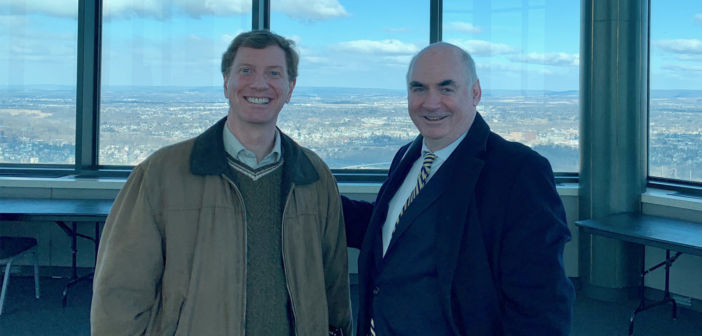Kevin Cassidy, the director of the (International Labour Organization) ILO Office for the U.S., toured Lehigh’s campus and gave a guest lecture for students enrolled in Global Citizenship and Labor Economics on Thursday. Cassidy has been the primary contact between the ILO and Lehigh. He also made the decision to host the ILO centenary conference on Lehigh’s campus and in Bethlehem on April 11.
As part of a series of Q&As with speakers, moderators and panelists who will take part in the conference, entitled “An Equitable and Sustainable Future of Work,” The Brown and White sat down with Cassidy to discuss his anticipation of the conference and his expertise on the subject. This Q&A has been edited for clarity and length.
Q: What aspect of your tour and interactions with students today was most inspiring to you as we get closer to the conference?
Kevin Cassidy: This is my third time on Lehigh’s campus, and what I’m encouraged by are sophisticated questions people have about how important what we do at the ILO, and how it’s relevant to their lives. But also in having the opportunity to meet the students and have them demystify what the UN is or what this institution called the ILO is and to show where those connections are.
What’s the most important thing? When I see recognition and head-nodding going on with the students — knowing that they get it. They might not 100 percent go with it, but they get it, and I think that’s the important thing in education.
Q: Transitioning to the content of the conference, what is most exciting for you as we look forward to the speakers and the panels and their perspectives, and them trying to synergize into one message for the conference?
KC: Three of the modules are on prescriptions that come out of our Future of Work Report: education, equality and supply chains. What we’re doing at Lehigh as one of the first institutions is applying this. Knowing that we’re able to share with the rest of the world the concerns and ideas of people here at Lehigh, students at Lehigh and faculty at Lehigh about what the future of work holds.
But what’s also really important is that this is one of the few events that we’ll do all year that’s almost exclusively students. And the most important thing if we want to change mindsets is that we need engaged audiences.
For example, to tackle gender-discriminatory practices, it’s not just about the women we need to empower, but we also need to change mindsets of men and boys. If we want to change the trajectory for our economy for the world we live in to a rights-based approach, it’s the students, the people who are going to be the next generation of workers, who have to understand something even beyond their own area of expertise.
Q: How do you think students should balance that awareness that they need to be a part of something bigger with the day-to-day grind of developing increasingly multidimensional skills and constant learning that has become customary to achieve success?
KC: It’s very tough because you have a very short period of time to get all of the knowledge you need — front-loading your education so you can live off of that for the next 30-40 years. What we realize now is that we need a certain level of education in order to compete.
But as you move forward and as technology and as demographics and other issues — mega-drivers like climate change and access to natural resources — all changes around us, we have to be prepared to up-skill or reskill ourselves. Lawyers in the past would be hired by legions to do discovering for documents. If you have a high-speed scanner and put those documents in, that work that could have taken 20 people four months to do. It is now done in an instant. So now, 20-30 lawyers are out of work. How do we reskill them? They’re already high-skilled people. How do we get these already very highly educated people, as well as people who may not have had the opportunity for higher education to be able to find new work for themselves?
We talk about social protection — we use the word social, but social protection is an economic stabilizer. If I lose my job I shouldn’t just fall into poverty. Should the government just let me go off and fend for myself? I don’t think that’s an enlightened policy politically, economically or socially.
So when we say social, we’re just talking about people. When we talk about social justice, it’s people who shouldn’t be discriminated against under law. When we talk about social protection, it’s providing opportunities for people not to be falling into poverty and then spiral and cycle of intergenerational poverty. We need to see that we’re in this together, as a nation, as an economy and as a globe.
Q: As someone who’s seeing the international perspective but representing the United States within that, what challenges facing the workforce are more global in nature and what challenges are more domestic?
KC: I would have to say that domestic is global.
For demographics, do we have enough jobs for people? For education, are we investing enough and do we have the best skill sets we need here? I think what we see nationally is a microcosm of what we see globally. The thing is that we’re all competing against one another.
If we don’t understand what the rules of the road are, we don’t know that we have to stop at a red light and not put on the gas and go through. We’re all going to crash into each other. So I think there has to be an understanding that putting in international regulatory frameworks are not a bad thing, it actually helps facilitate greater levels of achievement economically and socially.
Q: What do you hope students will take from the lessons the ILO puts forth in being a tripartite organization — having government, worker and employer representation?
KC: The value of tripartism as the ILO has seen it is to bring in people who are going to be affected by these decisions. You’re not going to want to be told, “You can’t do this because we’ve now decided the rules are such.” Where was my voice in all of this? What did I believe about that? I think the issue is that by having a multiplicity of voices, we have a range of options. And a good idea can come from anywhere.
I always relate back to a story of a management training class I did where we had a ball that we had to share with each other and everyone had to touch the ball. Whichever group did that the fastest won. A lady in our group who didn’t contribute at all and we all thought was switched off came up to us. We all thought that we’d kick it back and forth or throw it back and forth and she said, “I do this with my kids. All you do is put your hands over one another and we’ll drop the ball through that.”
It was the simplest solution to something we were paining over and that made me think, “Don’t discount people, because good ideas can come anywhere.”






Comment policy
Comments posted to The Brown and White website are reviewed by a moderator before being approved. Incendiary speech or harassing language, including comments targeted at individuals, may be deemed unacceptable and not published. Spam and other soliciting will also be declined.
The Brown and White also reserves the right to not publish entirely anonymous comments.